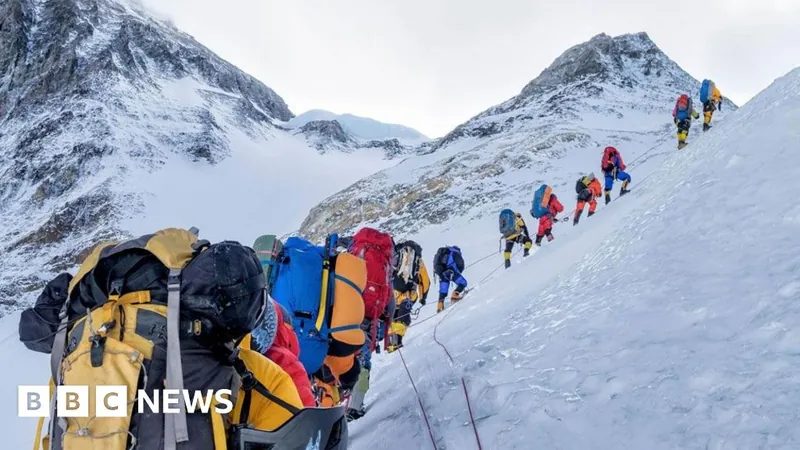
Shockingly High Permit Fees for Mount Everest Climb! Are You Ready to Pay?
2025-01-23
Author: Jia
Introduction
For the first time in almost a decade, aspiring climbers seeking to conquer Mount Everest will face a steep increase in permit fees. Starting this September, the cost to scale the world's highest peak during the prime climbing season will jump to $15,000—a staggering 36% rise from the previous fee of $11,000, as announced by Nepalese officials this week.
Increased Fees for Off-Peak Climbs
But that's not all! Fees for those aiming to reach the summit outside the peak climbing window of April to May will also see significant increases. Climbers venturing to mountaineer between September and November will have to pay $7,500, while those daring to brave the winter months from December to February will incur a fee of $3,750.
Economic Impact
These permit fees serve as a critical revenue stream for Nepal, contributing over 4% to the nation's economy through mountaineering and trekking tourism. However, this fee hike raises questions about the future of climbing on Everest, especially given the ongoing debate among mountaineering professionals about the increasing number of permits issued each year. Currently, around 300 permits are granted annually, leading to concerns about overcrowding on the already perilous routes.
Official Statement
Narayan Prasad Regmi, the director general of the Department of Tourism, emphasized that the royalty fees had not been revised for an extended period, making this increase necessary. While he did not elaborate on the allocation of the additional revenue, many hope the funds will be directed toward enhancing safety measures and preserving the mountain's fragile environment.
Community Reactions
Prominent British climber Kenton Cool, who has triumphantly reached the summit of Everest 18 times, commented that this fee hike was expected and would likely not significantly deter foreign climbers. "In the grand scheme of the cost to climb Everest, it won't impact most foreign climbers," he remarked, expressing hope that the extra funds will be utilized effectively for mountain conservation.
Regulatory Adjustments
This fee adjustment aligns with a broader push for better management of Everest's climbing activities. In April 2024, Nepal's Supreme Court mandated the government to restrict the issuance of mountaineering permits, highlighting the necessity to respect the mountain's ecological capacity—though they did not establish a specific cap on the permits.
Overcrowding Issues
Overcrowding has become a pressing issue, with climbers often facing perilous queues at the summit. In light of such dangers, the Nepalese army has conducted annual clean-up efforts to tackle the increasing accumulation of garbage on Everest, which has been dubbed the world's highest garbage dump. Since initiating these efforts in 2019, at least five clean-ups have successfully removed 119 tonnes of trash, as well as 14 human remains and several skeletons, with estimates suggesting that up to 200 bodies may still lie on the mountain.
Conclusion
Nepal, a country renowned for its breathtaking landscapes, is home to eight of the world's 14 highest mountains, including Everest. As the climbing community braces for this price hike, the crucial question remains: will this mark the start of a new era for climbing on Everest, or simply a temporary speed bump for determined adventurers? The eyes of the world will be watching!





 Brasil (PT)
Brasil (PT)
 Canada (EN)
Canada (EN)
 Chile (ES)
Chile (ES)
 Česko (CS)
Česko (CS)
 대한민국 (KO)
대한민국 (KO)
 España (ES)
España (ES)
 France (FR)
France (FR)
 Hong Kong (EN)
Hong Kong (EN)
 Italia (IT)
Italia (IT)
 日本 (JA)
日本 (JA)
 Magyarország (HU)
Magyarország (HU)
 Norge (NO)
Norge (NO)
 Polska (PL)
Polska (PL)
 Schweiz (DE)
Schweiz (DE)
 Singapore (EN)
Singapore (EN)
 Sverige (SV)
Sverige (SV)
 Suomi (FI)
Suomi (FI)
 Türkiye (TR)
Türkiye (TR)
 الإمارات العربية المتحدة (AR)
الإمارات العربية المتحدة (AR)